




By NOAH WASHINGTON
At 9:23 p.m., Imara Canady, cochair for Mayor Andre Dickens’ re-election watch party, took the stage inside the Hyatt Regency Atlanta to announce what the cheering crowd already expected: Andre Dickens had won a second term as Atlanta’s 61st mayor.
The Hyatt’s centennial ballroom glowed with celebration as supporters gathered around tables set with photos chronicling Dickens’ first term. A large screen replayed milestones from his administration, including the Moving Atlanta Forward agenda, affordable housing projects, and the mayor’s youth initiatives, serving as reminders of the groundwork laid since he was first sworn in as the city’s 60th mayor in 2022.
Polls closed across Atlanta at 8 p.m., and by 8:13 p.m., the Associated Press projected Dickens as the clear winner. He went on to secure more than 50 percent of the vote, defeating challengers Eddie Andrew Meredith, Helmut Domagalski, and Kalema Jackson.
The Victory Speech
Standing before an ecstatic crowd, Mayor Andre Dickens opened his victory speech with gratitude and reflection. “Mercy, God, thank you,” he began, beaming as supporters chanted “four more years” across the ballroom. “I’m so proud and humbled to serve the greatest city in the world,” Dickens said, recalling his journey from Adamsville to City

Hall. “At 16 years old, I dreamed of becoming mayor. I looked up to Mayor Jackson and Andrew Young, and I stand on the shoulders of those giants.”
He thanked his campaign team, volunteers, and family, especially his daughter, who cast her first vote for him that day, “The group project of Atlanta is unstoppable.”
A Mandate from the People
Moments after his victory speech, Dickens spoke with The Atlanta Voice, calling the night “an awesome moment, a landslide victory, and a mandate from the people.”

“They want four more years of what we’ve given them already, working together as a group project,” Dickens said. “Over the next four years, it’s going to be about bringing people together, unifying folks, and making sure our city’s growth is balanced, especially on the South Side. That means improving transit, healthcare, food access, and quality education all over the city, so we keep Atlanta safe and affordable.”
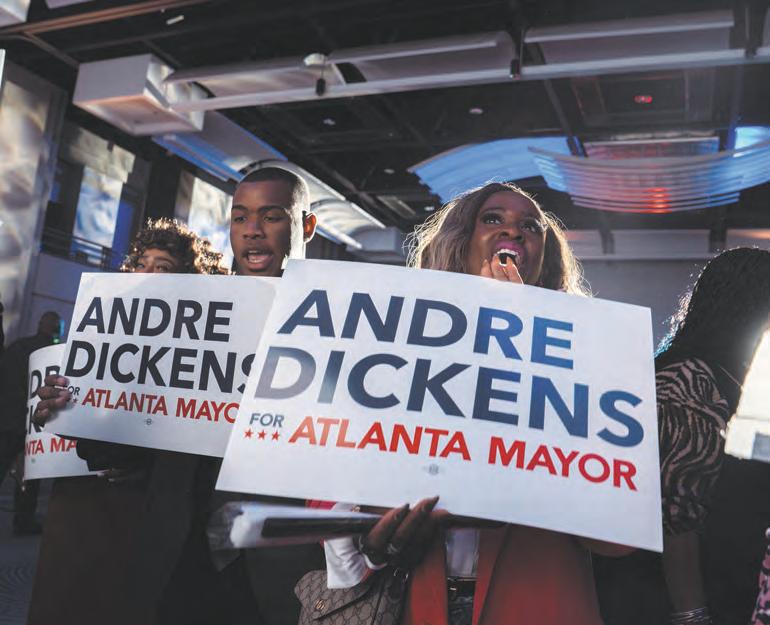
Under Dickens’ leadership, Atlanta achieved its first-ever AAA bond rating, marking the city’s strongest financial position in history. His administration launched the Moving Atlanta Forward infrastructure program, a multi-billion-dollar investment organized around four pillars: One Safe City, A City of Opportunity for All, A City Built for the Future, and Effective & Ethical Government.
A defining initiative of Dickens’ first term was his Year of the Youth campaign, launched in 2023 to expand mentorship, employment, and recreation programs for young Atlantans. The initiative created more than 3,000 youth job placements, extended recreation center hours, and funded new mental health and career readiness programs.
With Atlanta preparing to host matches for the 2026 FIFA World Cup, Dickens’ reelection signals continuity during a time of rapid growth. Co-chair of his re-election campaign, Ryan Wilson, co-founder and CEO
of The Gathering Spot, called the victory “a pivotal moment” for the city.
“We need a leader who understands Atlanta and works every single day to make sure we’re prepared for what’s ahead,” Wilson said. “This re-election wasn’t about fear, it was about telling the story of what’s been accomplished and why he’s the right person to lead us forward.”
Among the attendees celebrating Dickens’ win was former Georgia Lieutenant Governor Geoff Duncan, who recently announced his campaign for governor as a Democrat. Duncan praised the mayor’s leadership and consensus-building approach.
“He’s tackled the tough issues, from public safety to affordability, and built real consensus along the way,” Duncan said. “He’s doing a great job, and he’s going to be rewarded for it.”
Dickens’ reelection continues Atlanta’s six-decade tradition of two-term mayors. Since 1962, six of the city’s past eight mayors have won reelection, with Sam Massell being the last incumbent to lose, in 1973 to Maynard Jackson.
As the crowd’s chant of “Four more years” filled the Hyatt, Dickens smiled and summed up the spirit of the evening:
“This is about all of us,” he said. “Together, we’re going to keep building a city where everyone belongs.”
The Atlanta Voice proudly celebrates the induction of Publisher Janis Ware and her late father, J. Lowell Ware (1928–1991), into the 2025 Atlanta Press Club Hall of Fame, honoring their powerful legacy of journalism, justice, and community impact.
A visionary publisher and civil rights advocate, J. Lowell Ware founded The Atlanta Voice in 1966 after co-founding The Atlanta Inquirer, determined to amplify Black voices and tell stories the mainstream press ignored. He used journalism as a force for empowerment and progress, and co-founded the SUMMECH Community Development Corporation to help revitalize Atlanta’s historic neighborhoods.
Today, Janis Ware carries that mission forward as Publisher of The Atlanta Voice and Executive Director of SUMMECH. Under her leadership, The Atlanta Voice has evolved into a modern multimedia platform, and SUMMECH, in partnership, has built more
than 1,800 affordable homes in Atlanta’s Mechanicsville community.
Their Hall of Fame induction is more than a milestone. It’s a celebration of family, legacy, and the unwavering belief that media can uplift and transform communities.
Together, Janis and J. Lowell Ware are the heart of Atlanta’s Black press, champions of truth, empowerment, and progress whose influence endures across generations.

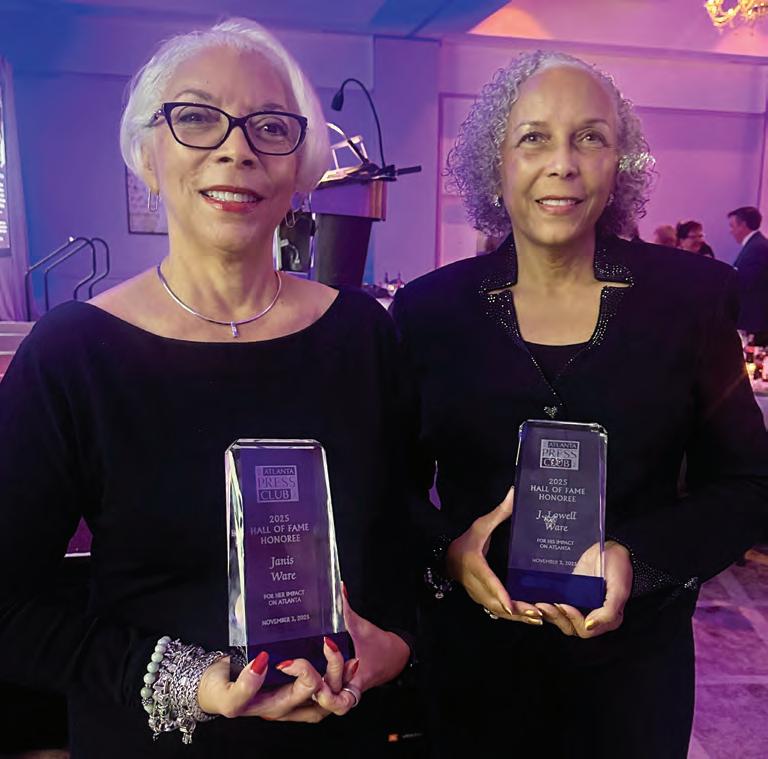

the smartest WiFi ever made,
By DEDRICK ASANTE-MUHAMMAD AND DR. LATOyA B. PARKER
In August 2025, the Black unemployment rate surged to 7.5% — about twice the rate for white workers (3.7%) and well above the national average of 4.3%. Washington, D.C., and Michigan had the highest Black unemployment rates in the second quarter of 2025, at 10.3% and 10%, respectively. These numbers are not mere statistics — they signal families set back, dreams delayed, and communities left more vulnerable each time the economy falters. For Black Americans, downturns hit harder, and recovery is slower. In these moments, only true wealth infrastructure — assets, homeownership, savings, and entrepreneurship — can anchor families and offer a genuine path forward.
As federal layoffs accelerate and key industries shed workers, families without assets face a familiar crisis: unemployment that threatens not just monthly bills, but housing stability and children’s futures. Black workers bear the heaviest burden, losing jobs first and finding new ones last each time the economy turns.
The Promise of the Family Self-Sufficiency Program
One model stands out: the Family Self-Sufficiency (FSS) program, HUD’s proven approach for helping low-income families turn rental assistance into long-term wealth. As participants’ incomes rise, so do their savings — thanks to an innovative escrow account that captures what otherwise would have gone toward higher rent. By graduation, many families have enough for a down payment, tuition, or even a small business venture. With $141 million in federal appropriations for 2025, FSS is a rare example of scalable, bipartisan anti-poverty policy — yet it faces perennial funding threats that put its gains at risk.
Asset-building programs like FSS, which Congress has protected even as recent budgets have targeted them for cuts, are essential to help families weather unemployment, avoid eviction, and create security that income alone cannot guarantee. In the wake of these disruptions, Black wealth infrastructure isn’t just important; it is essential for community and generational resilience. The effects are visible in lives transformed.
Take Marisabel, who entered the FSS Homeownership Track in Massachusetts as a renter struggling to get ahead. Through steady work, saving, and coaching, she bought her first home — turning uncertainty into lasting security for her family. Likewise, Tanisha Durrett, a single mother, became the proud owner of a bookkeeping business after completing FSS, crediting the program’s financial coaching for her leap into entrepreneurship.

However, even diligent saving can’t close the racial wealth gap alone. The pathways to prosperity increasingly run through new engines of economic growth — like clean energy, a $23 trillion market by 2030, expected to generate over a million jobs in the coming years. Yet Black Americans currently hold only 8% of jobs in the sector and own less than 1% of its companies. Even as industry leaders clamor to hire — “We need to hire 500,000 people in the next decade,” says Jason Grumet of the American Clean Power Association — systemic barriers persist.
Chief among these obstacles is unpaid training. As CEO Carla Walker-Miller notes, “If you want [Black people] to be trained, pay us… We need to be paid while we’re trained.” Without paid opportunities, participation remains limited — no matter how dire the labor shortage. For those who do break in, union positions offer real security: 8–19% higher wages and strong benefits. Most new roles require no college degree, making these jobs especially valuable for displaced workers.
Business ownership — vital for family and community wealth — remains out of reach for many. Fewer than a quarter of Black-owned clean energy companies get bank financing, compared to nearly half of white-owned firms. This persistent financing gap prevents Black entrepreneurs from scaling up and sharing new opportunities.
Programs like FSS, the Dearfield Fund for
Black Wealth, and D.C.’s Black Homeownership Fund reveal what’s possible. These efforts turn passive hope into asset-building action, helping families achieve homeownership, launch businesses, and stabilize entire neighborhoods.
To create lasting resilience, we must do three things:
• Expand asset-building programs like FSS and down payment supports nationwide so every hardworking family can own a home and build security.
• Open pathways to emerging industries with paid training, union jobs, and fair business opportunities.
• Reform lending and homeownership systems with targeted community investments and strict anti-discrimination rules.
If policymakers act with purpose — grounded in evidence — Black families will not only weather economic storms, but thrive: launching businesses, sending children to college, and building communities with enduring strength. True wealth infrastructure is more than a safety net — it’s the foundation for real and lasting mobility. There is no Black mobility without Black sustainability.
Dedrick Asante-Muhammad is the president of the Joint Center for Political and Economic Studies Dr. LaToya B. Parker is the senior researcher in the Office of the President at the Joint Center for Political and Economic Studies, where she leads the organization’s Economic Policy and Tax Policy programs.
FOUNDED
May 11, 1966
FOUNDER/EDITOR
Ed Clayton Immortalis Memoria
PUBLISHER/EDITOR
J. Lowell Ware Immortalis Memoria
The Atlanta Voice honors the life of J. Lowell Ware.
PUBLISHER
Janis Ware
PRESIDENT/
GENERAL MANAGER
James A. Washington 2018-2024
EXECUTIVE ASSISTANT TO PUBLISHER
Chia Suggs csuggs@theatlantavoice.com
EDITOR IN CHIEF Donnell Suggs editor@theatlantavoice.com
GENERAL ASSIGNMENT REPORTERS
Isaiah Singleton isingleton@theatlantavoice.com
Laura Nwogu lnwogu@theatlantavoice.com
Noah Washington nwashington@theatlantavoice.com
BUSINESS REPORTER
Tabius McCoy tmccoy@theatlantavoice.com
EDITOR AT LARGE
Stan Washington swashington@theatlantavoice.com
ADVERTISING, SALES & CIRCULATION
ADVERTISING ADMINISTRATOR
Chia Suggs advertising@theatlantavoice.com
SALES
RDW Jackson rdwadman@gmail.com
SUBMISSIONS
editor@theatlantavoice.com
DIRECTOR OF PUBLIC RELATIONS
Martel Sharpe msharpe@theatlantavoice.com
CONTACT INFORMATION
633 Pryor Street, S.W. Atlanta, GA 30312 Office: 404-524-6426 info@theatlantavoice.com


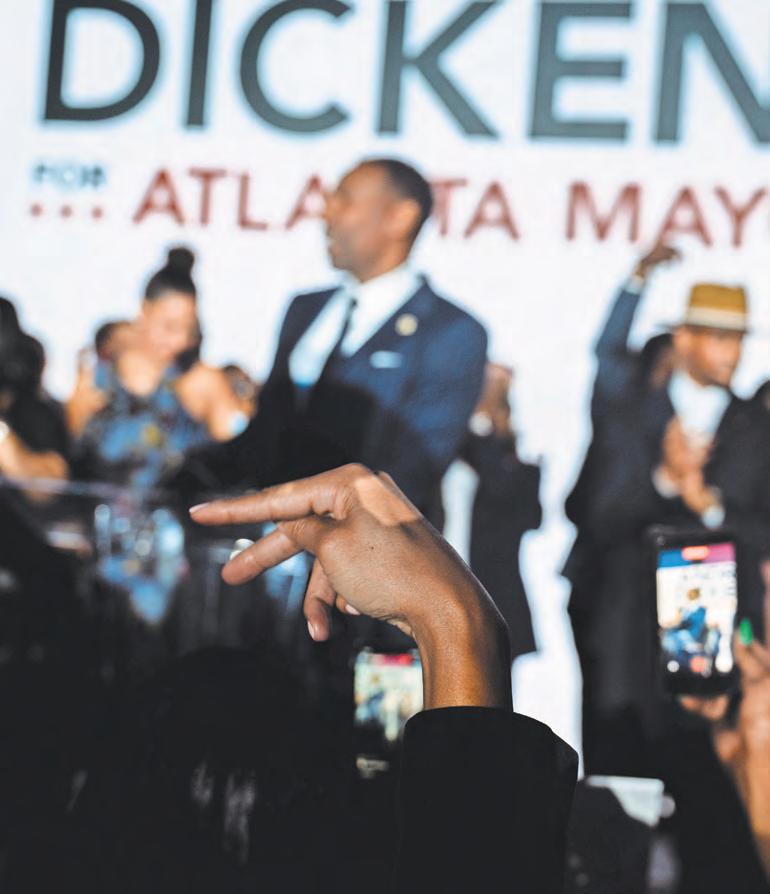
By DONNELL SUGGS
Midterm elections are notoriously under-attended, but Georgia’s voters turned out for the only statewide race in the 2025 cycle. The Public Safety Commission races for Districts 2 and 3 turned blue last night.
Alicia Johnson defeated incumbent Tim Echols, and Peter Hubbard won his contest with incumbent Fitz Johnson. Both Ms. Johnson and Hubbard are Democrats, and heavily focused on lowering utility costs for their constituents during their campaigns.
On Tuesday, Nov. 4, the voters voted overwhelmingly for both. Ms. Johnson won 62% of the vote, while Hubbard did the same.
The ongoing government shutdown had to play a part in the way Georgia voters cast their votes for the public safety commission seats. According to data from the Secretary of State Office, Johnson (977,613) and Hubbard (979,335) received nearly 980,000 votes.
Locally, Atlanta Mayor Andre Dickens won a second term with 86% of the vote, while Atlanta City Councilwoman Marci Collier Overstreet won the council president seat over challenger Rohit Malhotra. The election was close. Overstreet, a longtime member of
the Atlanta City Council, won just 51.36% of the vote.
Nationally, there was a similar shift and quite possibly a change in political tone for 2026 with the elections of the first female governor in Virginia, the first Muslim Mayor in New York City, the first female mayor in the history of Detroit, and a new leader in New Jersey’s governor’s mansion.
Democratic candidate Abigail Spanberger was overwhelmingly elected as the first female governor of Virginia on Tuesday night. Spenberger was endorsed by former United States President Barack Obama. Mary Sheffield was elected the first female mayor of Detroit in hundreds of years. A Democrat, Sheffield, may have won a local election, but set the tone for the evening’s shift towards female leadership around the country.
Zoran Mamdani will be the first Muslim Mayor of New York City when he is inaugurated at the beginning of the new year. Mamdani, self-described as a Democratic socialist, was also endorsed by Obama.
The Proposition 50 ballot referendum in California passed with nearly 64% of the vote. The ballot measure will redraw the state’s congressional map in favor of Democrats.










By ISAIAH SINGLETON
The Metropolitan Atlanta Rapid Transit Authority (MARTA) will replace its entire fare collection system over the next six months, with a goal of spring 2026 for implementation and customer transition.
The system will keep the popular Breeze name, but fare media and fare collection equipment, including Breeze cards and tickets, faregates and validators, Breeze vending machines, and the mobile app, will be updated and modernized, along with fareboxes in later project phases.
MARTA Interim GM/CEO Jonathan Hunt said as he mentioned before, his main goals as interim general manager are to increase ridership and improve the customer experience.
“The way to do that is by delivering safe, clean, and reliable service through routine excellence every day,” he said. “I want to continue beating the drum to ensure customers, partners, and
stakeholders know MARTA is committed to these goals and committed to a customer-centered focus. The Better Breeze equipment marks a crucial step towards those goals.”
Hunt says the next generation of modern Breeze fare collection systems is easier, more flexible, and a more secure way to pay for service.
“It is a complete modernization of our entire system and fare gates and validators,” he said.
“We have new ticketing vending machines, a new app, and newly designed Breeze cards. The state of technology has changed, and our customers have changed, and MARTA needs to meet our customers where they are.”
Between now and April 2026, Hunt says MARTA will continue the installation of hardware and software for the new system. Their first installation took place at Lindbergh MARTA Station, where MARTA officials displayed a preview of what the new system would look like. Currently, they are working on

installation at the Doraville MARTA Station.
“The construction schedule has been developed to keep access to MARTA riders with the current Breeze system while installing the new
one. You will see new equipment at rail stations in the coming months, but it won’t be ready for use yet,” he said. “You will still use your current Breeze card until we do the rollout in April 2026.”
By NOAH WASHINGTON
Stories are not just words on a page. They are a blueprint for possibilities. That belief resonated with the attending audience at The Dogwood on Saturday evening as the National Black Child Development Institute (NBCDI), which hosted its inaugural Book, Toy & Media (BTM) Awards, honoring the creators who are shaping how Black children see themselves and the worlds they imagine.
Held Oct. 25 as part of NBCDI’s 2025 National Conference, the event marked a milestone for the 50-year-old organization, whose mission is to build a just future where every Black child is celebrated, protected, and empowered. “The BTM Awards are more than a celebration; they are a declaration,” said Dr. Leah Austin, president and CEO of NBCDI. “If there is ever a time to have an organization focused on Black children and their families, it’s now. We do this work unapologetically.”
Austin said the decision to host the event in Atlanta was intentional. “Atlanta is the Black Mecca,” she said. “It’s the perfect place to launch these inaugural awards, a city that’s not only rich in history and advocacy but also the Black Hollywood of the South.”
This year’s honorees included U.S. Sen. Raphael Warnock, Dr. Lisa Williams, Jacqueline Woodson, Ralph Farquhar, Bruce W. Smith, and Makeda Mays Green, each recognized for advancing culturally affirming storytelling across generations and media.
Smith and his partner, Farquhar, creators of
The Proud Family, were recognized for their impact and contributions to media and culture. and Smith reflected on receiving recognition from his community. “It means everything to receive this from my people,” he said. “In the animation community, there are the Annies and the Oscars, but they don’t often see us. The NAACP Awards and now this, mean the most, because they come from us. That’s why we make the work we do.”
Smith said The Proud Family’s legacy is rooted in heart and humanity, not algorithms or trends. Reflecting on the current state of the industry, he acknowledged that “animation is being dwindled” as studios turn to artificial intelligence and scale back creative divisions. Still, he said, the power of storytelling endures beyond technology. “Our stories are beyond technology; it’s not about technology when it comes to telling our stories,” Smith said. “While technology is involved in helping us tell them, at the end of the day, it’s about the heart of The Proud Family. It’s about who we are as a people, and that will never change.”
Makeda Mays Green, SVP, Digital and Cultural Consumer Insights, who was also honored during the evening, recalled watching Romper Room as a child and never hearing her name during the show’s iconic roll call. “I wanted to know that I was seen,” she said. “Now, to be in a space where I can foster intentional visibility means the world to me. This fight isn’t just for me, it’s for our children, for every child who needs to feel they matter.”
Storytelling as Resistance
Jamilah Thompkins-Bigelow, winner of the Infinite Possibilities Book Award for Your Name Is a
Song, described the evening as “a celebration of Black children and the people who work hard to ensure those children are affirmed.”
Tonight is important because it’s a celebration of Black children and the people who work hard to ensure that those children are affirmed. That’s what is special to me, all these people coming together around celebrating the young Black child and their development.”
For Tyshia Ingram, creator of the ABC Affirmation Flash Cards – Black Boy Joy and winner of the First Light Toy Award, representation begins at playtime. “When I made these cards, I wanted little Black boys to see themselves reflected in every letter, every word,” she said. “I wanted them to know they are smart, kind, powerful, and loved. That’s what joy looks like, seeing yourself in the story.”
“Language Is Power”
Keynote speaker Jason Reynolds, the #1 New York Times bestselling author, delivered a reflection on growing up in the 1980s, a time shaped by the crack epidemic, hip-hop, and the absence of representation in literature.
“I grew up reading stories that didn’t see me,” Reynolds said. “My teachers told me to build a relationship with literature, but I couldn’t love something that didn’t love me back. Hip-hop gave me that relationship; it made my life neon.”
He recalled writing his first poem after his grandmother’s passing. “When my mother printed my words on her funeral program, I realized language was power,” he said. “And if you have language, you have power.”
A Future Where Every Black Child Is Seen Supported by sponsors including Disney

The National Black Child Development Institute (NBCDI) hosted its inaugural Book, Toy & Media (BTM) Awards. Photo by Noah Washington/The Atlanta Voice
Branded Television, Bainum Family Foundation, Penguin Young Readers, and Random House Children’s Books, the BTM Awards honored creators across five categories, each redefining the standard for storytelling rooted in cultural affirmation.
Dr. Austin reflected on the purpose of the moment and the movement it represents. “Representation isn’t optional,” she said. “It’s essential. We’re saying to our children: the world is yours.”
By DONNELL SUGGS
The pulpit at Big Bethel AME Church has always been filled with public speakers of note. On the morning of Thursday, Oct. 30, the church welcomed all but one of Atlanta’s living Black mayors to speak on the “Soul of Atlanta.”
Former Atlanta Mayor’s Ambassador Andrew Young, William “Bill” Campbell, Shirley Franklin, Kasim Reed, and current Atlanta Mayor Andre Dickens, along with Big Bethel AME Church Rev. Dr. Jonathan C. Augustine, spoke about how to further defend Atlanta’s legacy of “equality and inclusion.”
“This is only the kickoff; this is not the end,” Augustine said.
Days before the City of Atlanta and Fulton County will elect or re-elect a mayor and a city council president, the pews inside Big Bethel were full of people looking to hear what luminaries like Young had to say about Atlanta’s legacy.
“This is where it all began,” said Young, a preacher in many ways. “I think we have accidentally, with the guidance of God, and the officials you all have elected, we have become one of the best cities in the world.” Young, the second Black mayor in the
city’s history, shared stories about how Atlantans, both Black and white, got together to make the city better. Those stories included the first Black Mayor of Atlanta, the late Maynard Jackson, who broke business barriers by securing citywide contracts. Young also used the city securing the 1996 Summer Olympics bid in 1990 as an example of everyone working together for a common goal.
“I want to thank you for believing in God’s message that was put in your heart and mine,” Young said.
Atlanta City Councilwoman Marci Collier Overstreet and gubernatorial candidate Jason Esteves were also in attendance.
Dickens also spoke, as did Valerie Jackson, Mayor Jackson’s widow. Mrs. Jackson said she knows the late mayor would be proud of the direction the city has taken since the three-term mayor passed away.
“We will not allow the principle of fairness and justice to be blown back,” Mrs. Jackson said.
After telling a story about Mayor Jackson’s decision to steer more airport contracts to Black vendors, Mrs. Jackson said, “Maynard’s policies of inclusion became a model, not just for the state, but for the nation.”
Former Atlanta Mayor Keisha Lance Bottoms was not in attendance.
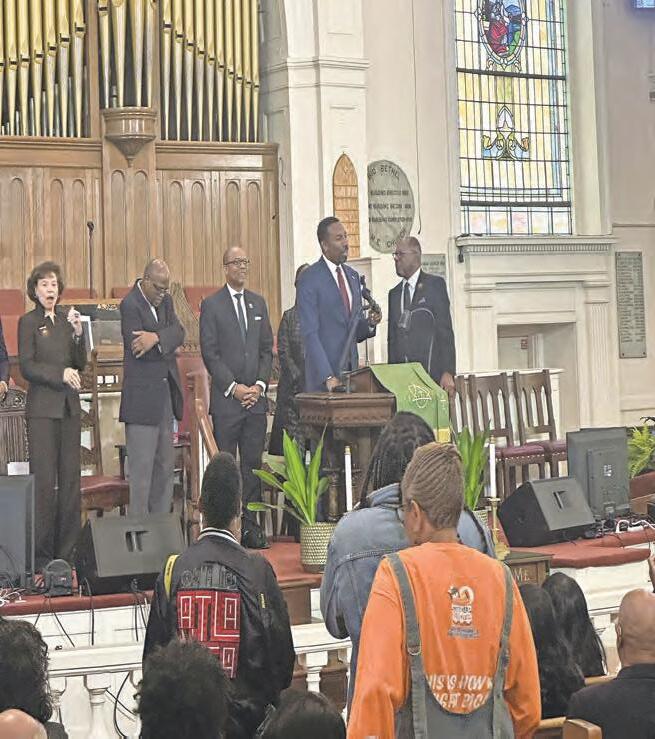
By CLAy TON GUTZMORE
The Academy for Innovation in Medicine (AIM) aims to provide students in Georgia with a stepping stone into the world of healthcare. The organization recently announced its opening of Georgia’s first healthcare-focused charter public middle and high school in 2026. This institution will provide students with real-world experience and serve as a pipeline for them to pursue high-demand careers in medicine, research, and healthcare. Dr. Kristy Beam is the lead founder of AIM. She and the team want parents across Georgia to enroll their children in a place that will launch them into a field that desperately needs passionate people.
“Parents should enroll their kids because we are offering them an opportunity to learn, grow, and prepare for a future in healthcare. We want to create a system where the outcomes are students thriving in their personal life, experiencing career fulfillment, earning a family-sustaining wage,” said Dr. Beam.
AIM’s healthcare-focused charter
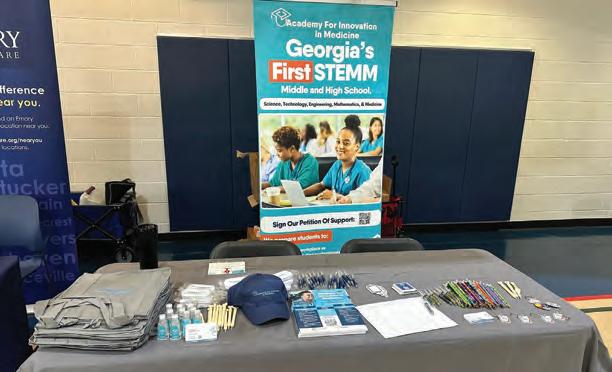
Credit: AIM Facebook Page
public school will open in fall 2026. The school intends to enroll 260 students in its first year and expand further in the future. The announcement about the school was made in September, following approval from the Georgia State Charter School Commission.
The school will offer students the opportunity for career exploration in healthcare while in middle school. That stage will build their foundation for the rigorous pathway in high school. When the
students reach ninth and tenth grade, they will begin their first career pathway through the Georgia Department of Education’s Health Science pathways. This will allow students to earn their first certification by the age of 16. When students reach the 11th and 12th grades, they will focus on obtaining their associate degrees and other certifications. By the time they graduate, they are prepared to earn a living wage.
This endeavor is a collaboration
among AIM, Grady Health Systems, and Redefined Atlanta. All three organizations aim to resolve the workforce shortage.
According to the Georgia Chamber of Commerce, Georgia has 40,000 openings in the healthcare industry, and experts expect this gap to grow to 100,000 by 2030. Through the school, AIM wants to cultivate the next generation of Healthcare workers.
“We are addressing the critical healthcare workforce need. There are jobs out there that need to be filled. We are very intentionally training our students to be ready for success in those specific jobs, and that ensures they have economic mobility,” said Beam.
Grady Health System will provide the real-world experience for the students at the school. Dr. Beam explains that students will visit the hospital to observe how professionals work and the tools they use. Dr. Beam and her team are also deliberate in selecting which medical professionals present to the students. They want the kids to see a vision of what they
can become. Kayla Sledge is a Georgia educator and parent. She will be enrolling her son next fall and wants to spark his interest in this career at AIM’s school.
“I want to see that moment where the lightbulb goes off when you see a person that looks like you in the spaces you want to be in. I want my son exposed to that as early as possible,” said Sledge.
“We just get focused on children getting A’s and B’s and then learning grade-level standards. We do not really prepare them for life outside of school. To know that there is a school where he can be learning grade level standards while also piquing his interest and getting him exposure to the field and what it is going to look like is Amazing,” said Sledge.
AIM’s healthcare-focused charter school is set to provide Atlanta Middle and High School students with a significant step towards the medical field. With all that’s assembling for Fall 2026, Dr. Beam and her team are ensuring there is no limit on what their future students can achieve.
By NOAH WASHINGTON
You may have heard that phrase growing up, a call to nurture our intellect, creativity, and potential. Coined in 1972 by the United Negro College Fund, the slogan became a national reminder of the power of education. On Monday evening, that message took on new life as the Woodruff Arts Center launched Georgia’s NeuroArts Coalition, an initiative exploring how art and neuroscience intersect to improve health, learning, and community connection.
Held at Atlanta Symphony Hall, the event drew more than 500 artists, scientists, educators, and civic leaders for the debut of The Arts + Health Laboratory, Georgia’s branch of the national NeuroArts Blueprint Initiative. The Blueprint, a collaboration between Johns Hopkins University’s International Arts + Mind Lab and the Aspen Institute, leads the Global Community NeuroArts Coalitions Network, a framework uniting cities worldwide to use arts-based approaches for health and well-being.
“This is a cultural shift,” said Susan Magsamen, co-founder and co-director of the
NeuroArts Blueprint Initiative and author of “Your Brain on Art.
“We’re standing on the verge of a new era where the arts can deliver potent, accessible, and proven health and well-being solutions to billions of people.”
Magsamen explained that the NeuroArts Coalition model helps communities identify measurable outcomes and strengthen collaboration between science and the arts, an approach endorsed by the National Endowment for the Arts, which has emphasized that artists and researchers learn best by working together. “When we experience art together, our neurons literally start to fire together,” she said. “We become more open and empathetic to each other. That’s what music can do for us.”
Each Community NeuroArts Coalition (CNC) is designed to reflect the diversity of its community while linking researchers, artists, educators, and public health leaders to co-create evidence-based programs. Using local asset mapping and community-based participatory research, CNCs develop interventions tailored to regional needs, from improving maternal health to reducing social isolation through the arts.


Georgia’s Arts + Health Laboratory will connect the Alliance Theatre, Atlanta Symphony Orchestra, High Museum of Art, and academic partners such as Georgia Tech, Emory University, and the Morehouse School of Medicine.
“The arts are not an accessory, they’re essential to how we live, learn, and heal,” Magsamen said.
The evening featured a piano performance by Dr. Adrian Tyndall, Dean of the Morehouse School of Medicine, followed by remarks from Georgia Tech President Ángel Cabrera and two panel discussions exploring how the arts can both nurture developing brains and repair degenerating ones.
During the planned programming, Tinashe Kajese-Bolden, artistic director of the Alliance Theatre, introduced a performance from Milo
Imagines the World, a new musical about empathy and imagination.
“When young people see someone close to their age on stage creating something brave and true, it expands how they see themselves,” she said. “Imagination is our birthright; it’s how we find resilience, identity, and belonging.”
In an interview with The Atlanta Voice after the program, Kajese-Bolden reflected on the Alliance Theatre’s “Babies Can Read” program, which integrates theater with early literacy for children ages zero to five. “It’s not about creating more actors or musicians,” she said. “It’s about creating a generation with more curiosity, more hope, and the ability to imagine a world where they’re not just surviving, but thriving.”
By LAURA NWOGU
Miami’s Michelin-recognized Ghee Indian Kitchen has opened in West Midtown, bringing its bold and traditional farm-to-table flavors to Atlanta. Located in the Star Metals District and in the former Wagamama space, Ghee wraps diners in a plush setting of warm, yellow lighting and splashes of dark wood and terracotta as they feast on family-style dishes with ingredients sourced directly from chef Niven Patel’s organic farm, Rancho Patel.
Owned by Patel and restaurateur Mohamed “Mo” Alkassar, the pair said they were constantly receiving requests for an Atlanta restaurant from diners who visited the Miami location. They celebrated the grand opening of their Atlanta location on Oct. 23 to enthusiastic locals excited to try the area’s newest eatery. Since opening its doors in the Dadeland neighborhood in 2017, Ghee has built a reputation for serving creative and fresh dishes infused with authenticity, earning the Michelin Bib Gourmand award for four consecutive years.
“It’s really about the spices that we use. There’s a small village in India that holds all my recipes. It’s all grown fresh and then shipped once a month. The quality and the blends that I do, they’re very unique to what Ghee is,” Patel said.
The menu features dishes such as duck biryani and several curries, including Kerala lamb. It also offers small plates, such as mushroom momo, yellowfin tuna bhel, samosa chaat, short rib dosa, and various naan variations. A 13-course tasting menu offers 13 dishes for $65 per person, providing guests with a diverse selection that includes their papaya salad, sag paneer, and a sticky date dessert topped with ginger ice cream.
While the Miami and Atlanta menus are identical, Patel shared he hopes to incorporate Southern influences by introducing a boiled peanuts dish in the future.

“For the Indian clientele, it really packs a punch. But then, what makes me happy about Ghee is that it’s very approachable. People who haven’t had Indian food, you don’t have to be intimidated coming to Ghee. There are a lot of great flavors that aren’t crazy spicy. Anybody can come eat here.”
Patel shared that Atlanta is just the next stop for them. Alkassar and Patel hope to continue expanding the restaurant into a national brand that people all over can enjoy.
“Usually, when you grow, a lot of people will say, it’s not the same. We really want to prove to people that we can grow and keep everything consistent.”


Whether you’re looking to purchase your first home, build your dream home, refinance or renovate, United Bank has the mortgage program to fit your needs.
By DONNELL SUGGS
Parents and family members gathered to eat pizza and drink soft drinks in what would normally be the press box at OTE Arena on Saturday night. It was the opening week of the fifth season of what was once a basketball experiment for young players looking to go pro, and has since sent players to the National Basketball Association (NBA), high-level Division I NCAA programs, and overseas.
The family members watched their relatives, young basketball prospects like Marcus Spears, Jr., David Baliraine, Kam Mercer, Mathias Vazquez, Taylen Kinney, and Tyran Frazier move up and down the court. Former NBA All-Star and McDonald’s All-American Jermaine O’Neal roamed the sideline for one of the teams, Faze. Still looks like he could play a couple of minutes at the age of 47.
Fans of all stripes filled the stands inside OTE Arena. Another opening weekend sellout was taking place.
Basketball was in the air in Midtown.
Five years ago, the idea of hosting a high-level basketball game in Atlantic Station was just that - an idea. Bringing in young, talented amateurs who would give up their eligibility to turn pro and play for Overtime Elite was like nothing the sport had ever seen. Would it work? Flash forward five years and success stories like the Thompson twins, Amen and Ausar are playing significant minutes for the Houston Rockets and Detroit Pistons.

Overtime Elite is working, says the league’s co-founder and CEO, Dan Porter. Asked what he believes are the reasons why, Porter said, “If I had to pick the top three reasons, I’d say that we never forget that we’re in the audience business. I also think that young people want to see people who are like them. There’s something about seeing someone and saying, ‘I can be like him one day. ’
Sitting back in his seat, Porter paused before he gave his third reason.
“Atlanta,” he said. “The city really welcomed us.”
At halftime, fans made their way over to the

multiple concessions stands around the arena and over to the gift shop. During the league’s first year, there were barely any concessions for sale. Other fans were making signs at the poster station. Small improvements like these are part of the league’s growth.
“To me, personally, it speaks to the power of possibility and the ability to take an idea and turn it into reality,” said Anna Karefa-Johnson, the VP of Experiential Strategy and Live Events.
The buzz around OTE feels like it hasn’t subsided over the years. There are 20 new players in the league this year, with 12 of them being ranked among the top 100 2026 recruits in the country. Players like Kinney and Spears, Jr., are being recruited by hundreds of collegiate programs.
Karefa-Johnson said the continued high level of interest from college programs is more proof that five years in, OTE is working beyond

any expectations.
“What we have been able to prove is that there isn’t a problem or challenge we’re not able to meet,” Karefa-Johnson said.
Mindy DeBruce, OTE’s Head of Player Services and Experience, has been with OTE for the past four years. The former head softball coach at Historically Black College and University (HBCU) Albany State University, DeBruce’s focus is on the players. Having been in charge of a non-revenue sport at an HBCU, DeBruce understands the importance of balancing the needs and wants of players.
“I believe it’s going incredibly well because of our ability to pivot in the marketplace,” DeBruce said. “We’ve grown and grown.”
During the game, the first of two on Friday night, DeBruce could be seen making her way down a hallway while escorting the family of one of the players.
“We provide multiple options for the kids,” said DeBruce, a wife and mother.
One of the players OTE personnel hopes will grow up during this season is Vazquez. A 6-foot-8 forward from Brazil in his first season with OTE, on one particular trip upcourt, Vazquez took a jab-step, pump-faked his defender, and instead of driving by him, he took a three-pointer. The ball went through the net. The chances of a talented young player like him with full college eligibility getting a shot at a Division I scholarship at a Power 5 program like the ones at Georgia Tech or the University of Georgia are assured. He could also go play overseas after he’s done at OTE. Like DeBruce said, these players have options, and that is why they continue to choose OTE five years after the first group signed on the dotted line. The experiment that is OTE continues.
“It’s unique, it’s not patterned after anything else,” Karefa-Johnson said about OTE.
Asked what she’s most proud of after being a part of the program from day one, Karefa-Johnson said it was the opportunities this league has been able to provide to players and staff members.
“We’ve found the best people,” she said.

Spacious 1-Bedroom Affordable! Rent Based on Annual Income Amenities, Great Location, and Convenient to Marta Please call for detailed information (404) 586-9098


BS/equiv & 5 yrs exp incl. 3 yrs w/ SAP GUI, SAP Financial Accounting, SAP Fiori, Jira, SAP Srvc Now, ALM, SAP S/4HANA, MM, SD, PP, PS, Treasury moduls, & SAP Analytics Cloud. Travel/reloc req’d. Send résumé to Magnum Opus IT, Inc., 8215 Roswell Rd, Building 900, Ste 930, Atlanta, GA 30350
Snowflake Inc. has mltpl Senior Cloud Support Engineer-Data Platform positions avail in Atlanta, GA. Prvide email, web & phne supprt to Snowflake customrs & prtnrs & dcumnt knwn slutions to intrnl & extrnl knwldgebse. Tlcmtg prmttd. Successful candidate’s starting sal will be dtrmnd based on permissible, non-discriminatory fctrs such as skills, exp, & geo lctn. This role is also elgbl for a cmptve bnfts pckge that incld: medical, dental, vision, life, & disability insrnce; 401(k) ret plan; FSA & HSA; at least 12 paid holidays; PTO; parental leave; ee asst program; & other co bnfts. $149760 –181000/yr. To apply, send resume and transcripts w/ job title and Ref#7688025 to resume@snowflake.com. EOE.
FULTON COUNTY ADVERTISEMENT FOR ITBC
ITBC solicitation for 25ITBC1523198B-RT Uniforms, Footwear & Duty Gear for the Fulton County Police Department will be accepted online through BidNet Direct on Friday, November 28, 2025. All Bids submitted must be received no later than 11:00 a.m. local (Eastern) time on the stated date. https://www. bidnetdirect.com/georgia/fultoncounty
Scope of Work: Fulton County, Georgia (“County”) is soliciting Bids for the procurement of Uniforms, Footwear and Duty Gear for the Fulton County Police Department.
In order to obtain complete information about this solicitation, please click the link below where this document and supporting documents can be downloaded, https://www.bidnetdirect.com/georgia/fultoncounty
Fee: N/A
Term of Contract: This is an annual agreement with two (2) one (1) year renewal options.
Pre-Bid Conference: N/A
If you have any questions regarding this project please contact Roderic Terrell, APA, (404) 612-7965 or Email: roderic. terrell@fultoncountyga.gov.
Fulton County reserves the right to accept or reject any and all applications and to waive technicalities.


